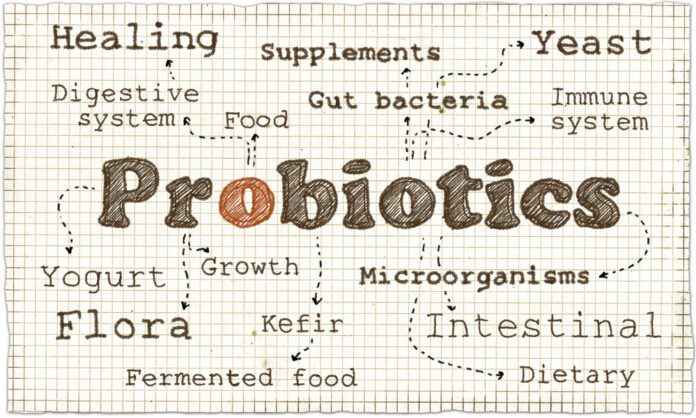About a trillion bacteria live in our gut, which are accompanied by yeasts and fungi. Out of the 1,000 different species, 5,000 distinct bacterial strains represent the gut microbiome. The best kind of probiotic acts as a support system to the gut.
Gut microbiomes live in a symbiotic relationship with our body. They get nutrients from our body and in return, they contribute to nutrient absorption, weight loss, immunity and ward off several diseases. Researchers are looking at probiotics as an add-on to the organ systems of our body.
Recent research states that for every human cell, there is a bacteria in our body. There are so many and not causing harm, then the gut microbiomes must be doing something beneficial. Otherwise, there is no need for the hype created around the use of probiotics as supplements. Right? Let’s look at probiotics in greater detail.
What Are Probiotics?
You may have been advised to consume a probiotic supplement after an extended antibiotic course. The reason is that antibiotics and certain other diseases can create havoc throughout the gut.
All of the gut bacteria do not work in sync with our body. They are a mix of harmful and good bacteria in our gut, with the good ones prevailing over the others. Sometimes this “perfect balance” is overturned. Age, diet, environment, genes, toxin exposure, health conditions and medications can have an impact on the microbiome colony. In this case, it is vital to restore the gut balance and the only way to do that is to call on for back up support from probiotics.
Probiotics help colonize the good bacteria inside our gut. According to The World Health Organization, probiotics are “live microorganisms that, when administered in adequate amounts, confer a health benefit on the host.”
Gut microbiota is unique for everyone. However, certain specific collections and compositions of bacteria are beneficial for us. Probiotics contain only those particular strains of bacteria, viruses, yeasts, and fungi that help preserve and enhance the good bacteria.
Supplements called synbiotics contain pro and prebiotics. Prebiotics consist of dietary fiber that acts as food for probiotics and other friendly bacteria in the gut.
Probiotics contain many bacterial genera, each having different species, which in turn comprise of various strains. Choosing the right type of probiotic is essential because each probiotic species addresses different disease states.
Criteria For Choosing A Probiotics
Probiotics are not an assorted assembly of random micro-organisms. For a species to meet the merit of labeled probiotic, certain characteristics are required, which includes:
- a probiotic supplement should have the ability to survive the acidic and alkaline juices of the stomach and intestine. A strain that is not able to tolerate acidic conditions, survive and grow in the presence of bile, and metabolize selective substrates at the site of destination is of no use to our gut
- an effective probiotic strain should have the ability to retain and deliver the functional health features for which they were initially selected
- a probiotic supplement should have an adequate shelf-life to retain a sufficient number of viable bacteria
- the bacterial strains in the probiotic supplement should be able to adhere to the intestinal cells adequately. The cell-adhesion property is crucial for the quality control of a probiotic supplement, essential to catering to the positive health effects. For example; cutting back on a diarrheal episode, enhancing immunity, and so on
- a probiotic supplement should be safe to consume
- a probiotic should have qualities like production of antimicrobial elements to keep a check on harmful or disease-causing strains
- a probiotic combination should be well equipped with resisting antibiotics to remain viable and functioning in the gut
- a probiotic strain should be supported by at least one positive human clinical trial conducted under generally accepted scientific standards
Types Of Probiotics
There are two specific types of bacterial strains commonly found in probiotics. These include:
- Lactobacillus
- Bifidobacterium
Some yeast strains may also be present in the probiotic supplement like Saccharomyces Boulardii.
It is essential to know the type of strains present in your probiotic supplement because every strain has a specific function to perform in the body. Some common types of probiotic types include:
- B. animalis
- B. lactis
- B. breve
- L. acidophilus
- B. longum
- L. reuteri
The B and L indicate the microorganism strains, while the name following the abbreviation indicates the strain species.
How Do Probiotics Work?
There are many ways probiotics work in our bodies. Because each strain is different, their functions vary also. Overall, a probiotic supplement helps:
- to digest and extract nutrients from digested food
- produce enzymes or antibacterial ingredients that kill pathogenic organisms
- stimulate and enhance the immune system
- aid the synthesis of certain hormones like vitamin K
Some of the specific strains and their functions are as follows:
- the B. animalis combats the disease-causing bacteria present in the food
- the B. breve helps ferment sugar and break down the plant fiber while warding off infection in the gut and vagina
- the B. longum is present exclusively in the gut and aids carbohydrate digestion and caters for antioxidant properties
- the L. reuteri is found in the oral cavity besides the gut and is proposed to fight off tooth decay
What Are The Benefits Of Probiotics?
Though still in infancy, the research explores the possible benefits of probiotics in certain disease states besides their general health benefits. Their effectiveness in this regard varies from case to case. Probiotics cater some of the conditions like:
- Inflammatory bowel disease
- Diarrhea (either infectious or antibiotic-induced)
- Constipation
- Gum and tooth diseases
- Yeast infections
- Urinary tract infections
- Upper respiratory tract infections (common cold, sinusitis)
- Eczema
- Lactose intolerance
- Septic infections
- Infections from helicobacter pylori
- Depression and anxiety
- Balancing good and bad cholesterol levels
- Managing blood pressure
Besides all of the above, specific probiotic strains may help in aiding weight loss and obesity. Studies show the positive effects of consuming probiotics containing lactobacillus gasseri, lactobacillus rhamnosus and bifidobacterium lactis regarding weight loss but more research is needed.
Also, research shows a connection between the gut and the brain, called the gut-brain axis. Studies also show that certain microbes, called psychobiotics, in the gut affect this axis. These are emerging as essential therapeutic tools for managing and treating certain brain and neurological disorders, such as autism, Alzheimer’s Disease and Parkinson’s Disease.
Probiotics have also been observed to increase the lifespan of cells by impacting their ability to multiply themselves. The action has a possible role as an anti-aging mechanism.
Probiotics are available as supplements and are also found in foods like yogurt, kefir, sauerkraut, tempeh, kimchi, miso, kombucha, and pickles buttermilk, natto, cheese (gouda, mozzarella, cheddar and cottage).
Individuals with a weak immune system (undergoing chemotherapy or suffering from any autoimmune disease), who have had some surgery, recently recovered from critical illness, or are at risk of antibiotic-resistance should not take probiotic supplements without consulting with their physician.
References
- https://www.biorxiv.org/content/10.1101/036103v1
- https://www.who.int/foodsafety/fs_management/en/probiotic_guidelines.pdf
- https://www.worldgastroenterology.org/UserFiles/file/guidelines/probiotics-and-prebiotics-english-2017.pdf
- https://pubmed.ncbi.nlm.nih.gov/25525379/
- https://www.ncbi.nlm.nih.gov/pmc/articles/PMC5745464/
- https://pubmed.ncbi.nlm.nih.gov/25400981/
- https://pubmed.ncbi.nlm.nih.gov/25047574/
- https://pubmed.ncbi.nlm.nih.gov/23912213/
- https://pubmed.ncbi.nlm.nih.gov/23886977/
- https://innovareacademics.in/journals/index.php/ijap/article/view/28249/15667








